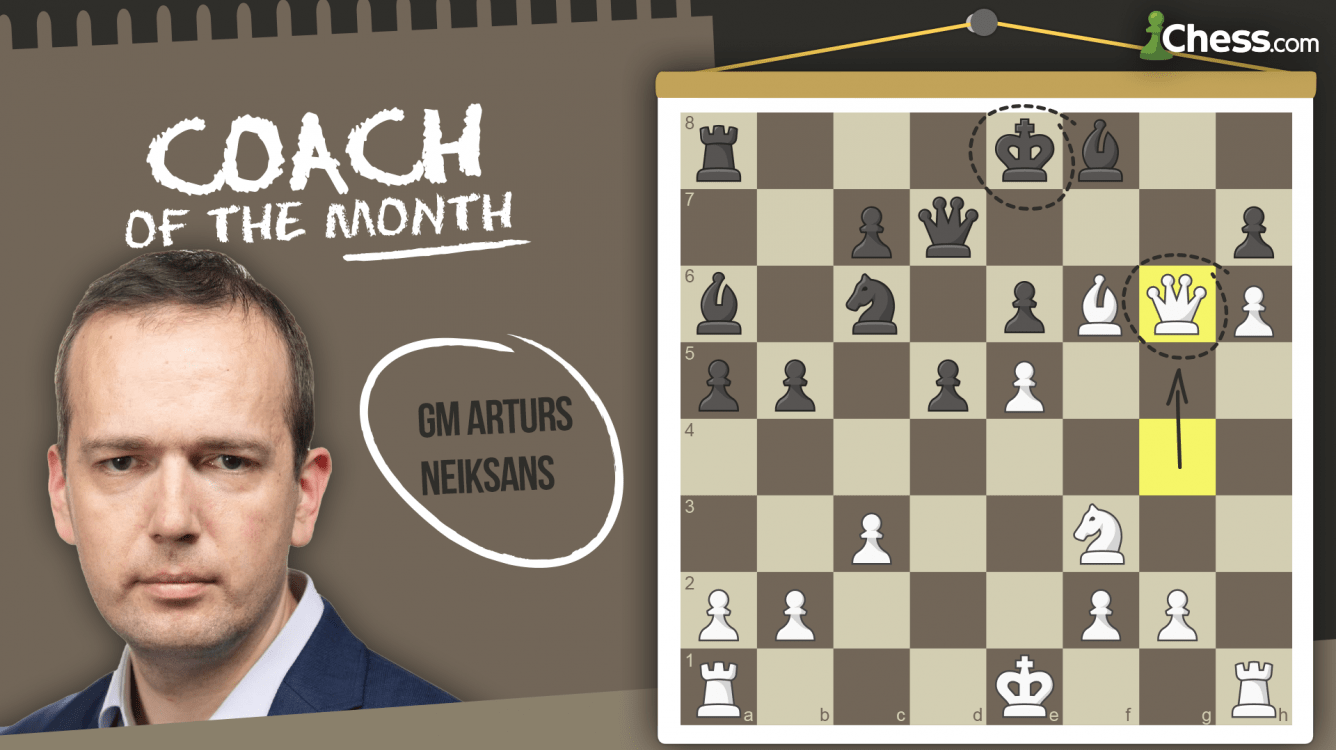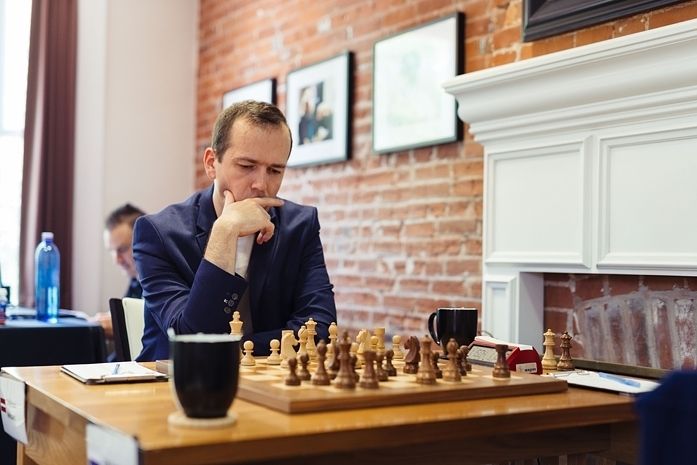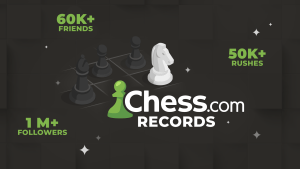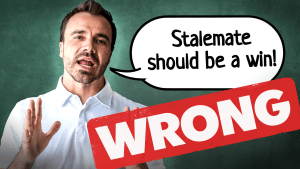
Coach Of The Month: GM Arturs Neiksans
Many people know GM Arturs Neiksans from his Twitch streams, where they constantly see him playing, solving puzzles, or helping people with his online "boot camps."
Anyone who watches as Neiksans streams has no doubt about his ability to pass his chess knowledge on to others. This, along with his love for interacting with other people, is what makes Neiksans a great coach—and the reason why he's July's coach of the month!
Readers seeking private instruction can contact Arturs Neiksans via his Chess.com profile and can find other skilled coaches at Chess.com/coaches.
At what age were you introduced to chess, and who introduced you?
I was born in a small Latvian town called Valka, which is right on the border with Estonia, with something like 5,000 inhabitants. One day after school, one of my classmates took me to the local chess club. I don't know if it was his first visit too, but I remember the date quite clearly: October 29, 1992.
I know it so precisely because that's when I received my very first certificate from the club! Some 25 years later on the same date, I gave it as a gift to the chess club in a nice frame—it was an emotional moment for me. I will always be grateful for the club and for my first chess coach, Vsevolods Dudzinskis—they shaped an important part of my life.
The moment I played my first chess game ever— the wooden pieces, the atmosphere in the club—I was immediately hooked on the game (apparently for a lifetime).

What is your first vivid memory from chess?
The smell of firewood! Valka's chess club was in two buildings at the time—the main building and sort of a storage unit/garage next to it where we would play both chess and novuss (a Latvian national board game similar to billiard). Probably because it was late autumn, the heating of the storage was provided by the firewood which created a specific smell and thus a very interesting atmosphere.
Which coaches were helpful to you in your chess career, and what was the most useful knowledge they imparted to you?
My very first chess coach was Vsevolods Dudzinskis who passed away last year at the age of 78. For us, boys aged between 9 and 12, he was a father figure who would always take care of us. We didn't only learn to play chess, we simply had some great times after school. We would play chess, novuss, table tennis, hide-and-seek, or just randomly climb on the roof of the storage unit. For that, I would be strongly reprimanded later, but that didn't stop me from repeating the feat.
In this informal atmosphere, I simply fell in love with the game and for that, I have to thank Vsevolods. Nobody was pressing me to study any strict hours—I would come and go as I pleased. Now, looking back at it, it was a different time. Thank God at the time there were no computers, internet, and social networks.

My second coach in Valka was Jevgenijs Ivanovskis who taught me some of the first serious steps in chess. I always admired his work ethic. In addition, he created this amazing tournament system for local kids. We had monthly tournaments throughout the year which would take us to the final event on Christmas with a Christmas tree and gifts.
Then there were certificates for victories in simple sparring matches. Ten victories would earn you a green certificate, 20 victories would get you a blue certificate, but 30 victories earned you the red certificate—and oh boy, it was so important to me!
Since Valka is so far away from the capital city Riga, I played in many tournaments in Estonia. At age 12-13, I started to challenge my coaches, and my ambition was to outplay Jevgenijs in a classical game, who was rated about 2300 at the time. To my knowledge, I never did.
Jevgenijs actually left the town for the capital city that same year, and Vsevolods was working mostly with newcomers, so I started to work with my third coach, Maris Koops. He was recognized as the strongest player in the region. Obviously, I set myself a goal to beat him in a game, which I believe I first did at the age of 13.

I left Valka when I was 15 in 1998, as my family moved closer to Riga. I enrolled in the Riga Chess School, and I reunited with Jevgenijs, who was working there. At some point later, I was taking some lessons with Latvian chess legend GM Janis Klovans. I had access to strong tournaments at this time, which eventually led to rapid growth. I can't say that I was a systematic student at the time, but I was doing something for my chess every single day.
Which game do you consider your "Magnus Opus?"
If I had played it out properly it would have been this one, but I messed it up.
Another game that jumps to my mind is one where I sacrificed two queens in one game! It's quite simple:
How would you describe your approach to chess coaching?
At the beginning of a long-term coaching relationship, I conduct an interview with the student and talk about everything related to chess. I want to know how motivated the student is, how hard they can work, if chess is their number-one sport, etc. Not everybody wants to become a world champion—a lot of people just like to play the game and learn a little more about it. Some just want to take a few lessons with a grandmaster. This is important for me to know.
When that part is clear, I draw a picture: who my student is, their characteristics, the kind of playing style they like, what their obvious weaknesses in chess are. Based on my observations, I create a training plan.
For individual lessons, I allow my students to choose a topic for us to discuss.
What do you consider your responsibility as a coach and which responsibilities fall on your student?
There's a difference between serious long-term coaching or some casual short-term sessions.
Regarding the first, my duty is to provide the student with top-notch information and teach them to work by themselves. It's important for me that the student is motivated and has ambitions. They should be willing to work on their own outside of coaching hours and following my instructions on homework. If that's not happening, there is not going to be significant growth. Unfortunately, sometimes students expect that the coach will bring "grandmaster knowledge" on a silver platter without them seriously having to invest their own time.
If I'm doing short-term training, I make sure that my student gets the most out of it and that it is as enjoyable as possible. I need to know how long it will last so that I can provide them the most important information on the topic of their choosing.

What piece of advice that you give your students do you think more chess players could benefit from?
Always study the classics! Know by heart the immortal games of all past world champions and other great players, understand their contribution to chess. The ideas from the older generation are much easier to understand. Today a standard modern game is a mix of something like 10 classical ideas, sometimes involving engine-like thinking.
What is your favorite teaching game that users might not have seen?
The first game which comes into my mind is Kasparov-Karpov (1990 World Championship, game 20), a very famous example. I've used this game in training sessions many times. I use it mostly to explain the attacking concept, that the material count during the attack is not important. My favorite part is this one:
The entire footage of almost three hours is something that I enjoy showing to my students—there's simply no better teaching resource than the minds of two world champions!
Quite often I'm using my own games for teaching. Many of them I remember from memory, so it's very easy to think of examples if I want to explain a certain concept. It's also quite practical since gathering information on a certain subtopic (for example, provocation, the long squeeze, certain types of positions) can be a very daunting task, and it's an ongoing process of months and years. Once you see an interesting example, save it! A good coach should be gathering information all the time.
Do you prefer to teach online or offline? What do you think is different about teaching online?
I think offline coaching is the best option since I feel like you can pass on to your student more information in a shorter time frame. There's also the human factor—I prefer talking with people face to face instead of through a camera. However, online lessons are still a strong alternative if offline lessons are not possible.
What do you consider the most valuable training tool that the internet provides?
It has to be access to training videos and puzzles. I do like reading good chess books, but in a video format the information digests a lot faster. Online puzzles for obvious reasons are superior to printed ones since you can move the pieces until the final move and immediately get the answer. I've used this resource a lot!
Which underappreciated chess book should every chess player read?
White and Black by Alexander Kotov, but I'm not 100 percent sure that it has been translated from Russian. It's about the life of Alexander Alekhine, his rivalry with Jose Raul Capablanca, and the rough times of being a chess professional. It was one of my favorite books during my childhood.
Prior coach of the month winners:


